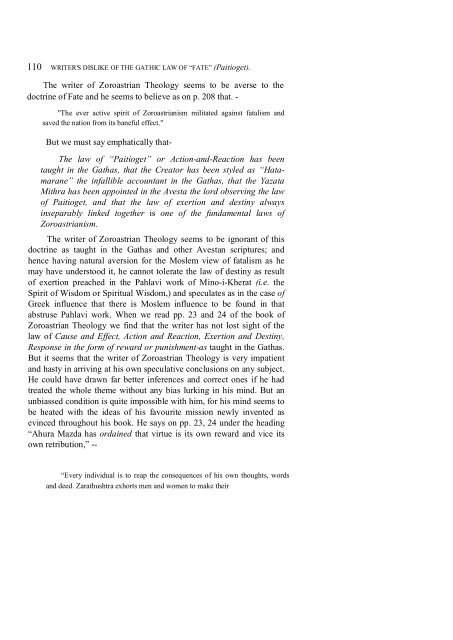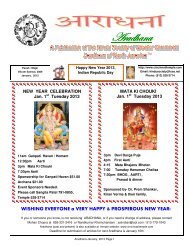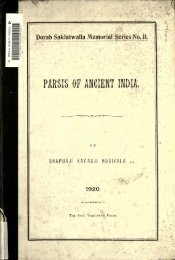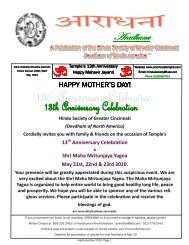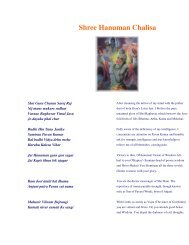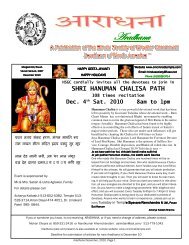- Page 2 and 3:
ZOROASTRIANISM ANCIENT AND MODERN ~
- Page 4 and 5:
THE ZOROASTRIAN RADIH SOCIETY The Z
- Page 6 and 7:
Types used in this Book : 1. Italic
- Page 8 and 9:
PREFACE -----*----- This book - per
- Page 10 and 11:
---------------------- After this l
- Page 12 and 13:
All Avesta - parts of one vast Whol
- Page 14 and 15:
Haoma-ceremony taught in Vendidad X
- Page 16 and 17:
“Vohu Manangha” or Good Mind an
- Page 18 and 19:
Magavan - the highest grade of Zoro
- Page 20 and 21:
Zoroaster - Teacher of Soul’s Maj
- Page 22 and 23:
Epilogue -- 440-442 A collection of
- Page 24 and 25:
33. Avesta as the vehicle of prayer
- Page 26 and 27:
has simply given out things existin
- Page 28 and 29:
xxiii the greatest, best and most e
- Page 30 and 31:
xxv (II) Atcha hoi schantu manangha
- Page 32 and 33:
6. The Writer’s cynical views of
- Page 34 and 35:
2 EXTENT OF THE ORIGINAL ZOROASTRIA
- Page 36 and 37:
4 NAMES OF THE 21 NASKS. It will no
- Page 38 and 39:
6 BAGHA, VASHTAG, HADOKHT, SPEND. 4
- Page 40 and 41:
8 BARASH, KASHASRUB, VISHTASP SASTE
- Page 42 and 43:
10 JAVIT-SHIDA-DAD, CHITRADAD, BAGH
- Page 44 and 45:
12 TEACHING OF RITUALS BY ZOROASTER
- Page 46 and 47:
14 SPLIT BETWED GATHAS AND LATER AV
- Page 48 and 49:
16 MOTIVE OF EXCLUDING AVESTA SCRIP
- Page 50 and 51:
_18 WRITER'S INCONSISTENCIES re PAH
- Page 52 and 53:
20 HERESY OF REDUCING ZOROASTRIAN A
- Page 54 and 55:
22 ARGUMENT BASED ON “VERBE” AN
- Page 56 and 57:
24 DIFFICULTY OF UNDERSTANDING THE
- Page 58 and 59:
26 GATHIC AND AVESTIC ANGELS AND DE
- Page 60 and 61:
28 “SOSHYANT” IN THE GATHAS AND
- Page 62 and 63:
30 DIFFERENT AUTHORSHIPS OF THE AVE
- Page 64 and 65:
32 VARIOUS STYLES AND METRES OF EXT
- Page 66 and 67:
34 UNDUE ADVANTAGE OF THE IGNORANCE
- Page 68 and 69:
36 THE FIRST AXIOM IN THE STUDY OF
- Page 70 and 71:
38 LATER AVESTA EXPLAIN AND SUPPLEM
- Page 72 and 73:
40 GATHIC AND AVESTIC AMESHA-SPENTA
- Page 74 and 75:
42 GATHIC AND AVESTIC DIVINENESS OF
- Page 76 and 77:
44 STYLE DIFFERS AS THE SUBJECT-MAT
- Page 78 and 79:
46 AHUNA VAIRYA - THE SOURCE OF ALL
- Page 80 and 81:
48 CHAPTER II. The Writer's harping
- Page 82 and 83:
50 THE WRITER-AN ADVOOATE OF CONVER
- Page 84 and 85:
52 PREACHING OF TRUTH-TO WHOM, WHEN
- Page 86 and 87:
54 NO RELIGION BEFORE ZOROASTER. fa
- Page 88 and 89:
56 YOISHTA-FRYANA - NO CONVERT. doe
- Page 90 and 91:
58 UNIVERSAL GREATNESS AND EFFICACY
- Page 92 and 93:
60 WRITER'S PERVERSION OF GATHA 49;
- Page 94 and 95:
62 UNIVERSAL UNFOLDMENT BY THE LAW
- Page 96 and 97:
64 ROYAL EXAMPLES OF DEVIATION FROM
- Page 98 and 99:
66_ WRITER'S IGNORANCE OF ORIGINAL
- Page 100 and 101:
68 DISCUSSION OF RELIGION NOT SAME
- Page 102 and 103:
70 POLITICAL INFLUENCE NOT SAME AS
- Page 104 and 105:
72 THE MAGI - NO PROSELYTES BUT ORI
- Page 106 and 107:
74 UNIVERSALITY OF ZOROASTRIAN LAW
- Page 108 and 109:
76 NO PROSELYTISM IN YACNA VIII, 7
- Page 110 and 111:
78 DIFFERENT RELIGIONS FOR DIFFEREN
- Page 112 and 113:
80 NO PROSELYTISM IN DIN AND HAOMA
- Page 114 and 115:
82 NO FROSELYTISM IN YACNA LXI OR L
- Page 116 and 117:
84 VIBRATIONARY EFFICACY OF YATHA,
- Page 118 and 119:
86 SAENA-AHUM-STUTA-NOT CONVERT BUT
- Page 120 and 121:
88 NO CHINAMAN CONVERTED To ZOROAST
- Page 122 and 123:
90 WHAT IS “ITHOTER RAVAYAT ?" by
- Page 124 and 125:
92 FIRST KNOW AND _PRACTICE YOUR RE
- Page 126 and 127:
94 WRITER'S REASONS con PROSELYTISM
- Page 128 and 129:
96 EXTINOTION OF ZOROASTRIAN COMMUN
- Page 130 and 131:
98 NEITHER AVESTA NOR PAHLAVI pro P
- Page 132 and 133:
100 PAHLAVI DINKARD ON STERILITY RE
- Page 134 and 135:
102 WE ARE 'tokhmak-paspan i.e. PRE
- Page 136 and 137:
104 IDEAL TEACHINGS CONSTITUTE LIFE
- Page 138 and 139:
106 PROSELYTISM NEVER ADVOCATED IN
- Page 140 and 141:
108 RITUALS TAUGHT IN MORE THAN ONE
- Page 142 and 143:
110 YACNA OR RITUALISTIC UNISON TAU
- Page 144 and 145:
112 GATHIC INEVITABLENESS OF YACNA
- Page 146 and 147:
114 IS HAOMA-CEREMONY OF A FOREIGN
- Page 148 and 149:
116 HAOMA-CEREMONY - POSITIVELY ZOR
- Page 150 and 151:
118 " DURAOSHEM" i.e. DEATH-REMOVIN
- Page 152 and 153: 120 HAOMA-CEREMONY TAUGHT IN VENDID
- Page 154 and 155: 122 ‘ASHEMAOGA’ i.e. A HERETIC
- Page 156 and 157: 124 ‘URVAN’ NEEDS ‘STAOTA’
- Page 158 and 159: 126 ZOROASTRIAN CEREMONIALS-SPIRITO
- Page 160 and 161: 128 THE INVISIBLE WORKING OF ZOROAS
- Page 162 and 163: 130 LAWS OF HIGHER SCIENCE TAUGHT I
- Page 164 and 165: 132 IMPORTANCE GIVEN IN AVESTA TO R
- Page 166 and 167: 134 THE ACTUAL SCIENTIFIC EFFICACY
- Page 168 and 169: 136 MASTER-SCIENTIST ZOROASTER; MAS
- Page 170 and 171: 138 THE RECITAL OF Patit i.e. EXPIA
- Page 172 and 173: 140 RITUALS-HELP POR THE SOUL ON TH
- Page 174 and 175: 142 ALL OEBIUIONIES BESIDES THREE N
- Page 176 and 177: 144 SOUL AND FAROHAR ALWAYS ATTACHE
- Page 178 and 179: 146 Farohar-A RAY EMANATING PROM TH
- Page 180 and 181: 148 RECIPROCAL BLESSINGS EFFECTED B
- Page 182 and 183: 150 PRODUCT OF Kerdar AND Yacna AFF
- Page 184 and 185: 152 Farohars OF SOULS DISTINCT FROM
- Page 186 and 187: 154 LACK OF GENUINE INFORMATION IN
- Page 188 and 189: 156 ZOROASTRIAN RELIGION AND RITUAL
- Page 190 and 191: 158 CONCLUDING AXIOMS re ZOROASTRIA
- Page 192 and 193: 160 ANTI-ZOROASTRIAN IDEAS FROM FOR
- Page 194 and 195: 162 CREDULITY--A GRAVE DEFECT IN WR
- Page 196 and 197: 164 THE ANGEL ARDVI SURA-CERTAINLY
- Page 198 and 199: 166 NO GREEK, INDIAN OR ARABIC INFL
- Page 200 and 201: 168 PAHLAVI & PERSIAN WRITERS FOR M
- Page 204 and 205: 172 WRITER'S SHAM KNOWLEDGE OF ZORO
- Page 206 and 207: 174 " Yacna" NEVER IMPLIES SACRIFIC
- Page 208 and 209: 176 NO SLAUGHTER BUT PROTECTION OF
- Page 210 and 211: 178 LIFELESS ANIMAL IS TERMED “NA
- Page 212 and 213: 180 Ashoi NEVER IMPLIES SLAUGHTER O
- Page 214 and 215: 182 “Gava” MEANS “MILK-LIBATI
- Page 216 and 217: 184 NO ADVOCACY OF ANIMAL-SLAUGHTER
- Page 218 and 219: 186 INCONSISTENCY BETWEEN GATHAS 32
- Page 220 and 221: 188 NO SLAUGHTER ADVOOATED FOR ARDV
- Page 222 and 223: 190 NO SLAUGHTER BY AHURA MAZDA FOR
- Page 224 and 225: 192 “Aspa” & “Ushtra” IN TH
- Page 226 and 227: 194 BOSH ABOUT ANIMAL-SLAUGHTER FRO
- Page 228 and 229: 196 OFFERING OF OFFAL OF ANIMALS TO
- Page 230 and 231: 198 SCRIPTURE-LANGUAGE DIFFERS FROM
- Page 232 and 233: 200 BODILY “ASHOI” NECESSITATES
- Page 234 and 235: 202 VEGETARIANISM-AN ORIGINAL PRINC
- Page 236 and 237: 204 THE IDEAL GOAL OF LIFE NECESSIT
- Page 238 and 239: 206 "VOHU MANANGHA" OR GOOD MIND &
- Page 240 and 241: 208 ZOROASTRIANISM MUST NEEDS IMPLY
- Page 242 and 243: 210 “Ahuna-Var” PRIOR TO THE EN
- Page 244 and 245: 212 “URU” - “YAZ” - “STAO
- Page 246 and 247: 214 IN TUNE WITH AHURA MAZDA THROUG
- Page 248 and 249: 216 Zarathushtra - THE FIRST PRACTI
- Page 250 and 251: 218 Staota Yacna-THE LAWS OF PRIME
- Page 252 and 253:
220 POWER, SUCCESS AURA & EFFICIENC
- Page 254 and 255:
222 Staota-Yacna- THE EXCELLENT Fun
- Page 256 and 257:
224 ATTUNEMENT WITH SRAOSHA THROUGH
- Page 258 and 259:
226 Vibration IS THE Fundament OF T
- Page 260 and 261:
228 FUNCTION OF Staota, IN THE EFFI
- Page 262 and 263:
230 STAOTA AT THE BOTTOM OF ZOROAST
- Page 264 and 265:
232 KNOWLEDGE & PRACTICE OF STAOTA-
- Page 266 and 267:
234 Druj DESTROYED & AHURA MAZDA AT
- Page 268 and 269:
236 Best-Existence ATTAINED BY Mant
- Page 270 and 271:
238 ATTUNEMENT WITH SROSH THROUGH T
- Page 272 and 273:
240 UNIVERSAL ATTUNEMENT BY MEANS O
- Page 274 and 275:
242 MANTHRA FOR THE Opus Magnus OF
- Page 276 and 277:
244 "POWERFUL EFFICACY of these Nam
- Page 278 and 279:
246 Manthra-cure & NAME OF KHORDAD
- Page 280 and 281:
248 Manthra Spenta IS superior TO A
- Page 282 and 283:
250 Ahuna Var IS ZARATHUSHTRA’S W
- Page 284 and 285:
252 Airyaman-Ishi Manthra NEXT TO F
- Page 286 and 287:
254 Rules DEDUCIBLE FROM THE AVESTA
- Page 288 and 289:
256 (3) (4) (5) (6) SPIRIT OF MANTH
- Page 290 and 291:
258 (12) Practitioners of Manthra A
- Page 292 and 293:
260 (7) (8) (9) Attunement with Ahu
- Page 294 and 295:
262 (2) (3) Manthra- AS WEAPON OF S
- Page 296 and 297:
264 WRITER’S IGNORANGE OF THE SPI
- Page 298 and 299:
266 EXTANT AVESTA TESTIMONY TO THE
- Page 300 and 301:
268 RECITAL OF Ashem Vohu AT THE EX
- Page 302 and 303:
870 AHUNA VAR - the Quintessence of
- Page 304 and 305:
272 WRITER’S OWN CYNICISM ABOUT T
- Page 306 and 307:
27 4 Pazend & Persian Recitals DO N
- Page 308 and 309:
276 WRITER'S PERVERSE ATTITUDE re E
- Page 310 and 311:
278 WRITER'S VIEWS re Magi-BORROWED
- Page 312 and 313:
280 WRITER’S DENIAL OF THE recogn
- Page 314 and 315:
282 THE AVESTA RECOGNISES THE Magi
- Page 316 and 317:
284 MAGIAN SYSTEM OF EXPOSURE OF CO
- Page 318 and 319:
286 THEORY OF THE Magian & Athravan
- Page 320 and 321:
288 ‘ZARATHUSHTRA HIMSELF A Magus
- Page 322 and 323:
290 Magi PRESERVE THE ORIGINAL TRUT
- Page 324 and 325:
292 Maya OR SPIRITUAL GREATNESS OF
- Page 326 and 327:
294 Magavan-THE HIGHEST GRADE OF ZO
- Page 328 and 329:
296 Sraosha Vereza - THE HOLIEST ar
- Page 330 and 331:
298 VENDIDAD IV; 47 DISTINGUISHES M
- Page 332 and 333:
300 Magav-THE Zoroastrian Ideal OF
- Page 334 and 335:
302. WRITER'S HOTOH-POTCH re MAGI L
- Page 336 and 337:
304 THE FAITH-KILLING FALSE THEORY
- Page 338 and 339:
306 AVESTA-NEITHER POST-ZOROASTRIAN
- Page 340 and 341:
308 ZOROASTRIAN RITUALS NOT AT ALL
- Page 342 and 343:
310 GATHIC IDEA OF EVIL SPIRIT NOT
- Page 344 and 345:
312 WRITER'S NONSENSE re COMPOSITIO
- Page 346 and 347:
314 BEAUTIES OF THE Avesta Yasht Li
- Page 348 and 349:
316 WRITER'S DENOUNCEMENT OF AVESTA
- Page 350 and 351:
318 WRITER'S BELIEF - AVESTA SCRIPT
- Page 352 and 353:
820 INDIAN STUDENTS blind belief IN
- Page 354 and 355:
322 DEPLORABLE INABILITY OF STUDENT
- Page 356 and 357:
324 NINE IMPORTANT POINTS re AUTHOR
- Page 358 and 359:
326 LAWS OF Hamaestara & Hazaosha i
- Page 360 and 361:
328 FULCRUM OF "Khoreh" IN ALL THE
- Page 362 and 363:
330 CANONS OF removing hair and nai
- Page 364 and 365:
332 Four “Urvanic” Powers RESUL
- Page 366 and 367:
334 A Life of "Drujih” LEADS TO R
- Page 368 and 369:
336 Drujih-ful Soul re-incarnated A
- Page 370 and 371:
338 Seclusion of Menstruous Women A
- Page 372 and 373:
340 PREGNANCY CAUSES OF GENERIC DRU
- Page 374 and 375:
342 FIGHT BETWEEN ASHOI & DRUJIH-OF
- Page 376 and 377:
344 DESTRUCTION OF SOME SPECIES OF
- Page 378 and 379:
346 . Ashoi & Srosh VERSUS Drujih &
- Page 380 and 381:
348 DESTRUCTION RESULTING FROM Mith
- Page 382 and 383:
350 Drujih-i-Buji AND SINS OF Sexua
- Page 384 and 385:
352 QUARTERS FOR MENSTRUOUS WOMEN A
- Page 386 and 387:
354 A MENSTRUOUS WOMAN RENDERS the
- Page 388 and 389:
356 Bodily Purity INDISPENSABLE TO
- Page 390 and 391:
358 THE WRITER-MOUTHPIECE OF A HAND
- Page 392 and 393:
360 ISOLATION OF MENSTRUOUS WOMAN &
- Page 394 and 395:
362 Druj-i-Nasu & THE LOOK OF A MEN
- Page 396 and 397:
364 “Kharenangh, “Khathra,”
- Page 398 and 399:
366 (I Kehrp(t" AFFECTED BY "A':hor
- Page 400 and 401:
368 Virtue or Aura REFERRED TO IN T
- Page 402 and 403:
370 Dravand i.e. EVIL ONES re-incar
- Page 404 and 405:
372 (vi) (vii) (viii) (ix) Ten Axio
- Page 406 and 407:
374 CANCELLATION OF RITUALS IN THE
- Page 408 and 409:
376 REFERENCES TO THE Unique positi
- Page 410 and 411:
378 ZOROASTER the One Advanced Soul
- Page 412 and 413:
380 ZOROASTER'S WILL PARALLEL TO TH
- Page 414 and 415:
382 PHYSICAL BODY OF ZOROASTER SUPE
- Page 416 and 417:
384 ZOROASTER'S Asn-i-Vir UNSURPASS
- Page 418 and 419:
386 Miracles of Zoroaster, - A FACT
- Page 420 and 421:
388 ZOROASTER-THOUGH A MAN, YET NOT
- Page 422 and 423:
390 ZOROASTER'S Spiritual Vision of
- Page 424 and 425:
392 Zoroaster’s SUCCESSFUL campai
- Page 426 and 427:
394 Meaning OF Daevas; Species OF D
- Page 428 and 429:
396. Haoma & otherKhastric Gun FOR
- Page 430 and 431:
398 WRITER'S REFERENCES TO ZOROASTE
- Page 432 and 433:
400 MIRACLES OF ZOROASTER - a Fact
- Page 434 and 435:
402 RATIONALE OF Miracle of Feet of
- Page 436 and 437:
404 No wife & children OF ZOROASTER
- Page 438 and 439:
406 WRITER'S TESTIMONY TO Ideal Gre
- Page 440 and 441:
408 HUMBLE ADDRESS TO ZOROASTER BY
- Page 442 and 443:
410 CHAPTER XI. Miscellaneous. We s
- Page 444 and 445:
412 Arda Viraf & Adarbad Marespand
- Page 446 and 447:
414 Progress IMPLIES INDIVIDUAL & U
- Page 448 and 449:
416 GATHIC “Khshnoom” - THE ORI
- Page 450 and 451:
418 “Razeng” & “Yacna” - MU
- Page 452 and 453:
420 THE Law revealed to ZOROASTER I
- Page 454 and 455:
422 THE Grand Cosmogenical Chart. 7
- Page 456 and 457:
424 ATTUNEMENT WITH 15 “Atash" of
- Page 458 and 459:
426 PHILOLOGY-SYSTEM STARTING WITH
- Page 460 and 461:
428 WRITER'S DISLIKE FOR Zoroastria
- Page 462 and 463:
430 Faith cleaved BY SPECULATIVE PH
- Page 464 and 465:
482 Faith & Practice SUPERIOR TO in
- Page 466 and 467:
434 EFFICACY OF "Gaomaeza" FROM "Ch
- Page 468 and 469:
436 DESTRUCTIVE DOGMAS OF RASH REFO
- Page 470 and 471:
438 NINE REMEMBERABLE POINTS re ZOR


